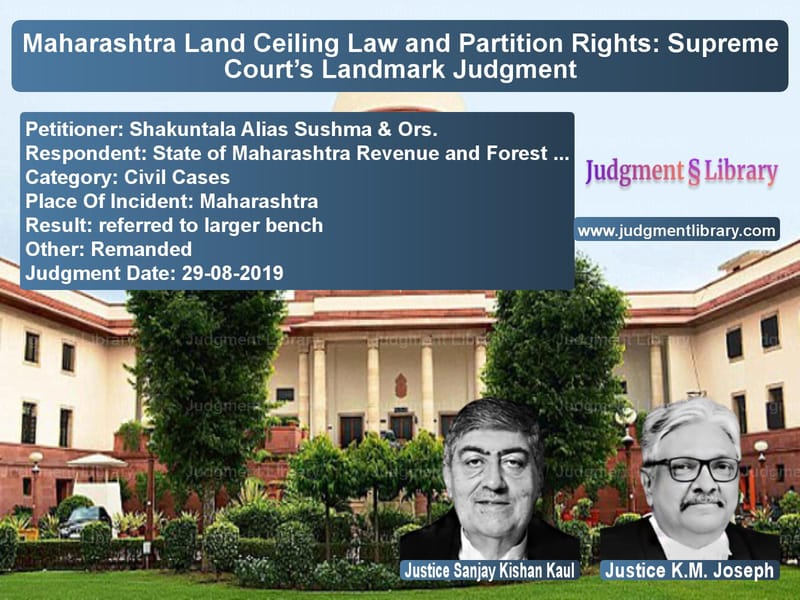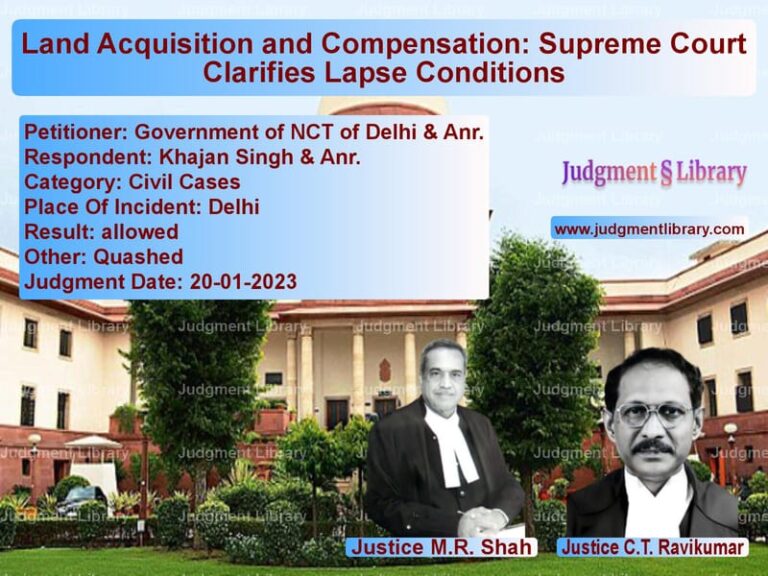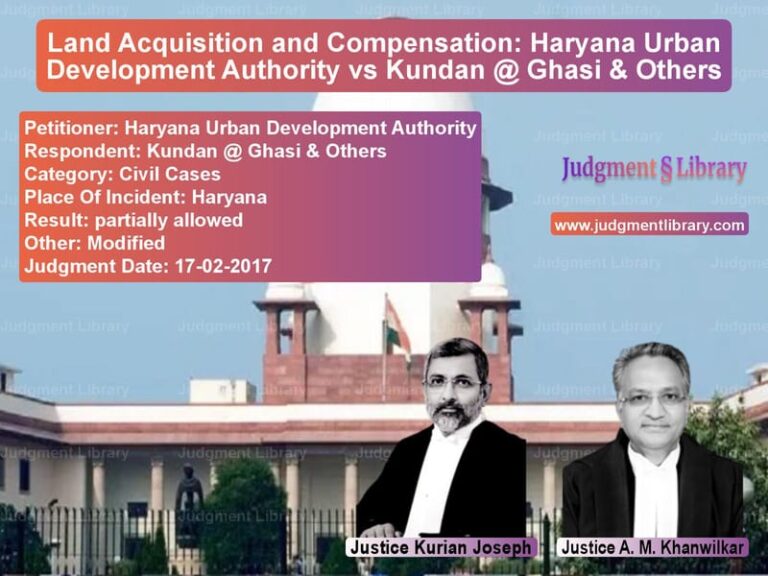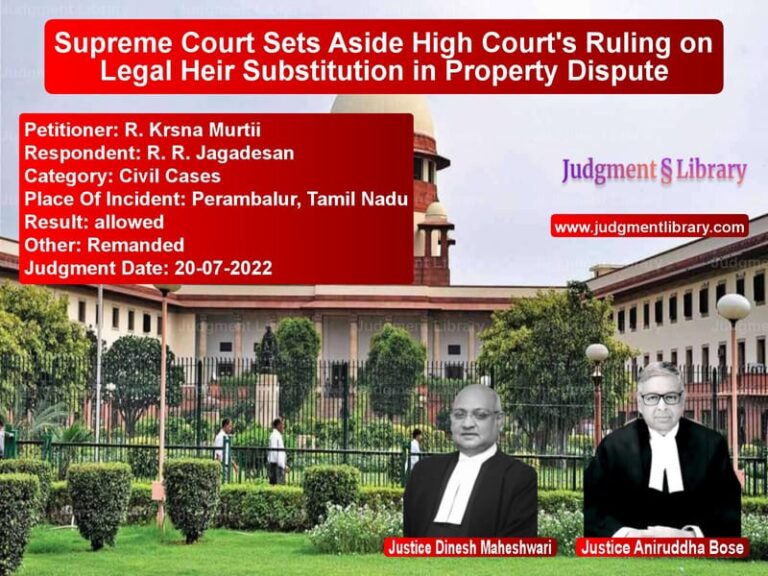Maharashtra Land Ceiling Law and Partition Rights: Supreme Court’s Landmark Judgment
The case of Vithaldas Jagannath Khatri (D) Through Shakuntala Alias Sushma & Ors. vs. State of Maharashtra Revenue and Forest Department & Ors. revolves around the interpretation of the Maharashtra Agricultural Lands (Ceiling on Holdings) Act, 1961. The Supreme Court had to decide whether a partition deed executed before the cut-off date of September 26, 1970, could be disregarded under the Act’s provisions and whether the properties allocated to the daughters in the partition could be included in the land ceiling calculations.
Background of the Case
The Maharashtra Agricultural Lands (Ceiling on Holdings) Act, 1961, was enacted to impose a ceiling on agricultural land holdings and redistribute surplus land to the landless poor. The Act aimed to prevent landowners from circumventing ceiling limits by distributing land among family members. The dispute in this case arose from a partition deed executed on January 31, 1970, by Late Shri Vithaldas Jagannath Khatri, wherein portions of agricultural land were allocated to his minor daughters.
After the Act came into force, the Surplus Lands Distribution Tribunal (SLDT) initiated proceedings, declaring 60 acres and 27 gunthas of land held by Vithaldas as surplus. The Maharashtra Revenue Tribunal upheld this decision. However, the High Court later ruled that the land given to the daughters should be included in the land ceiling calculations, as they were not legally entitled to a share in the ancestral property at the time of partition.
Arguments of the Parties
Appellants (Legal heirs of Vithaldas):
- The partition was executed before the cut-off date of September 26, 1970, and should be recognized as valid under the Act.
- Under Hindu law, a father has the moral and legal right to make provisions for his daughters, even if they were not coparceners at that time.
- The partition was a legitimate transaction and should not be disregarded under the Act.
- The exclusion of the daughters from the appellate proceedings violated principles of natural justice.
Respondents (State of Maharashtra):
- The partition was executed to evade land ceiling laws, making it a sham transaction.
- At the time of the partition, daughters had no legal right to a share in ancestral property, making the transaction invalid.
- The possession and cultivation records showed that Vithaldas continued to control the land, reinforcing the claim that the partition was not genuine.
Supreme Court’s Observations
The Court examined the provisions of the Act, including Sections 8, 10, and 11, which restricted the transfer and partition of land to prevent circumvention of land ceiling laws. The key legal question was whether the partition deed of 1970 could be deemed valid under the Act.
One of the most significant observations by the Court was:
“A partition that results in an unnatural distribution of property, particularly when the law at the time did not recognize daughters as coparceners, must be scrutinized for intent and legitimacy.”
Regarding the daughters’ rights, the Court noted:
“Although the daughters were not coparceners at the time of partition, Hindu law has long recognized the moral obligation of a father to provide for them. The question here is not merely about legal rights but whether the partition was genuine or an attempt to evade land ceiling laws.”
The Court also considered the lack of evidence showing that the daughters exercised independent control over the land. The revenue records and crop statements indicated that Vithaldas continued to cultivate the land.
Final Judgment
There was a split decision between the two judges:
- Justice Sanjay Kishan Kaul ruled in favor of the appellants, stating that the partition was valid and the land allocated to the daughters should not be included in the land ceiling calculations.
- Justice K.M. Joseph dissented, arguing that the partition was a sham and should not be recognized under the Act.
Due to this divergence in opinions, the case was referred to a larger bench for a final decision.
Key Takeaways from the Judgment
- Partition deeds executed before September 26, 1970, must be examined carefully for legitimacy.
- The burden of proof is on the landholder to demonstrate that a partition was genuine and not an attempt to evade land ceiling laws.
- Under Hindu law, a father can make provisions for his daughters, but such provisions must be bona fide and not a means to avoid statutory land ceilings.
- Revenue records and possession data play a crucial role in determining the authenticity of a partition.
Implications of the Judgment
This case has significant implications for land ceiling laws in India. It highlights the importance of scrutinizing transactions that appear to circumvent statutory ceilings. It also underscores the evolving nature of women’s property rights under Hindu law and the need to balance statutory provisions with principles of fairness and justice.
Conclusion
The Supreme Court’s ruling in this case brings attention to the complex interplay between land reform laws and traditional Hindu property rights. While the legal recognition of daughters’ property rights has evolved, retrospective claims must be scrutinized to prevent misuse of land ceiling exemptions. The final resolution of this case will set a precedent for similar disputes in the future.
Petitioner Name: Shakuntala Alias Sushma & Ors..Respondent Name: State of Maharashtra Revenue and Forest Department & Ors..Judgment By: Justice Sanjay Kishan Kaul, Justice K.M. Joseph.Place Of Incident: Maharashtra.Judgment Date: 29-08-2019.
Don’t miss out on the full details! Download the complete judgment in PDF format below and gain valuable insights instantly!
Download Judgment: Shakuntala Alias Sus vs State of Maharashtra Supreme Court of India Judgment Dated 29-08-2019.pdf
Direct Downlaod Judgment: Direct downlaod this Judgment
See all petitions in Property Disputes
See all petitions in Landlord-Tenant Disputes
See all petitions in Succession and Wills
See all petitions in Judgment by Sanjay Kishan Kaul
See all petitions in Judgment by K.M. Joseph
See all petitions in Referred to Larger Bench
See all petitions in Remanded
See all petitions in supreme court of India judgments August 2019
See all petitions in 2019 judgments
See all posts in Civil Cases Category
See all allowed petitions in Civil Cases Category
See all Dismissed petitions in Civil Cases Category
See all partially allowed petitions in Civil Cases Category






